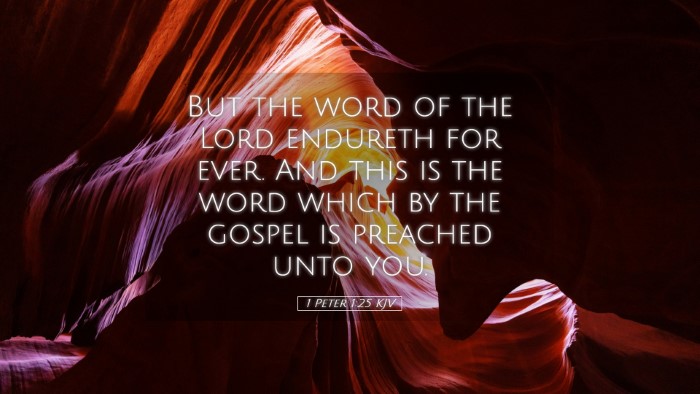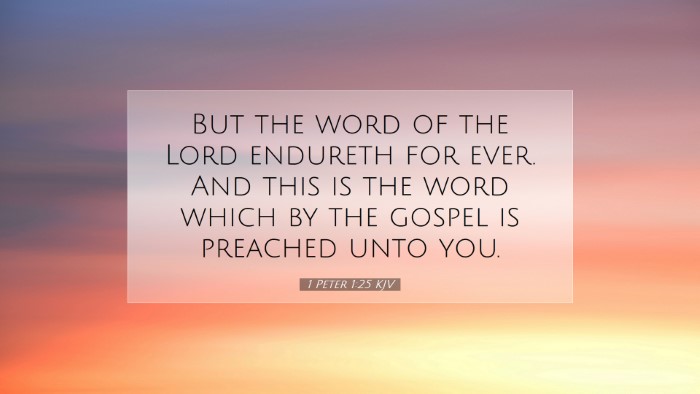Commentary on 1 Peter 1:25
Scripture Reference: 1 Peter 1:25 - “But the word of the Lord endures forever.” And this is the word which by the gospel is preached unto you.
Introduction
This verse encapsulates a profound truth about the eternal nature of God's Word contrasted with the temporary nature of human life and endeavors. The Apostle Peter emphasizes the contrast between the perishable things of this world and the imperishable Word of God. A careful examination of this passage provides invaluable insights into the nature of Scripture and its significance for believers.
Summary of Insights
-
The Nature of the Word of God:
Matthew Henry notes that the "word of the Lord" refers to the message of the gospel, which is divinely inspired and eternal. Unlike the fleeting glory of human achievements, God's Word remains steadfast and unchanging throughout the ages.
-
Contrast with Humanity:
Albert Barnes emphasizes the contrast presented in this verse. He reflects on how "all flesh is as grass," highlighting the frailty and transient nature of human life. The passage serves as a reminder that while human life fades, God's promises endure forever.
-
Hope in the Gospel:
Adam Clarke points out that the gospel is the specific message referred to here. This "word" has transformative power and brings hope of salvation, reminding believers of the lasting impact of the good news despite the challenges they may face in life.
-
The Assurance of God’s Promises:
The assurance that the Word of God "endures forever" provides a bedrock for the faith of believers. It underscores the reliability of God's promises and the truth of His messages, as indicated in both Henry and Barnes' analysis.
-
Application for Believers:
Pastors and theologians might approach this text by emphasizing its practical implications for the church. The enduring nature of God’s Word challenges Christians to root their lives in the Scriptures, which provide guidance and sustenance for growth in faith.
Theological Implications
The verse invites deep theological reflection on the nature of divine revelation. The enduring nature of God's Word signifies that the essence of God's truth is immutable, serving as a firm foundation for faith amid a secular society.
Transcendence of God’s Word
The concept of transcendence in relation to the Word of God is paramount. Matthew Henry writes that the Word of God transcends culture, time, and circumstance, applying universally to all generations and peoples. This aspect of the Word encourages men and women to engage with Scripture actively, employing it as a guide rather than a historical artifact.
Enduring Hope in Christ
Within this context, the gospel itself is eternally relevant. Adam Clarke emphasizes that the gospel was preached to Peter's audience offering them hope present in Christ, which remains applicable to believers today. This understanding reinforces a theological framework wherein hope is anchored not just in the person of Christ but in the truth of His message as presented in Scripture.
Conclusion
In summary, 1 Peter 1:25 provides a rich tapestry of insights into the enduring and transformative power of God’s Word. For pastors, students, and scholars alike, this verse stands as a vital reminder of the centrality of Scripture to the Christian faith. The transient nature of earthly life underlines the need for believers to cling to the eternal Word that offers hope, guidance, and the promise of salvation through the gospel.


